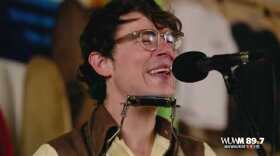The Canadian husband and wife duo, Whitehorse, joins us for an in-studio performance.
Let's get this out of the way first: Luke Doucet and Melissa McClelland, who form the band Whitehorse, are married. It's a subject that comes up a lot in interviews, but it is hardly the most interesting aspect to the band.
More interesting - to music lovers, anyway - is the unique, plugged in sound that Doucet and McClelland bring to the rootsy songs on their recent album, The Fate of the World Depends on This Kiss. At first listen, songs such "Mismatched Eyes" and "Out Like a Lion" sound like dips in amiable, acoustic waters. But a darker, more complex arrangement soon becomes evident.
"I'm a fan of - maybe it was T-Bone Burnett, talking about songwriting," Doucet tells Lake Effect's Mitch Teich, "saying, 'Keep the melodies simple and the harmonies complex,' and literally, that's good advice, but metaphorically, I think that's good advice, too. Do simple things, but do them elaborately, and do them well."
McClelland agrees.
"We never want to get too, too far down the rabbit hole. We want people to be able to connect to the melodies and at the same time, we can't help ourselves but have fun with it," she says.
Part of the fun comes at Whitehorse's live shows, such as their recent concert at Milwaukee's Shank Hall. Doucet says the sound of the band evolved as they looked for ways to make the concert experience more interesting.
"The electronic element was sort of a late-blooming element of what we do," Doucet explains. "And all of a sudden we were using [electronic] loops. But it's very important for people to understand that everything you hear on stage was created that day, that evening on the stage."
Doucet and McClelland point to a handful of artists, such as Beck, as pioneering the fusion of genres such as Delta Blues and hip-hop. But they say that wasn't their initial intent with Whitehorse.

And in producing the electronic samples live, on stage, they run the risk of messing them up and having to start a song again. But McClelland thinks people appreciate the spontaneity. "We're making ourselves really vulnerable up there. But not to the point where we want it to be awkward for everyone involved."
Vulnerability - like a married couple, performing songs about each other and with each other, on stage?
McClelland and Doucet will buy that analogy. "There's just the dynamic that exists, that you're not supposed to work with your spouse, period," Doucet says. "And not only are we working together, but we're touring together, so we're within slapping distance of each other for eight, ten, twelve weeks at a time," he jokes. "And so that does make us vulnerable. But at the same time, it's not like we had a 'normal' domestic life at some point and then decided to do this."
The two worked together on projects long before they were a romantic couple, they point out. "It's been very natural for us," McClelland says. But she agrees that putting their relationship in the public eye carries a certain vulnerability. "Even people responding to us after a show will say, 'Oh you guys look so in love,' and you know, we are, but we're a normal married couple, too. But mostly, we feel lucky that we get to share this passion."
But as we noted before, there's much more to Whitehorse than a marriage. "What has occurred to me lately," Doucet concludes, "and is kind of a relief, is the marriage is not the most interesting thing about this band. The way we make our music, and the musical conversation between us - I think those things are more interesting than the fact that we're a married couple."





